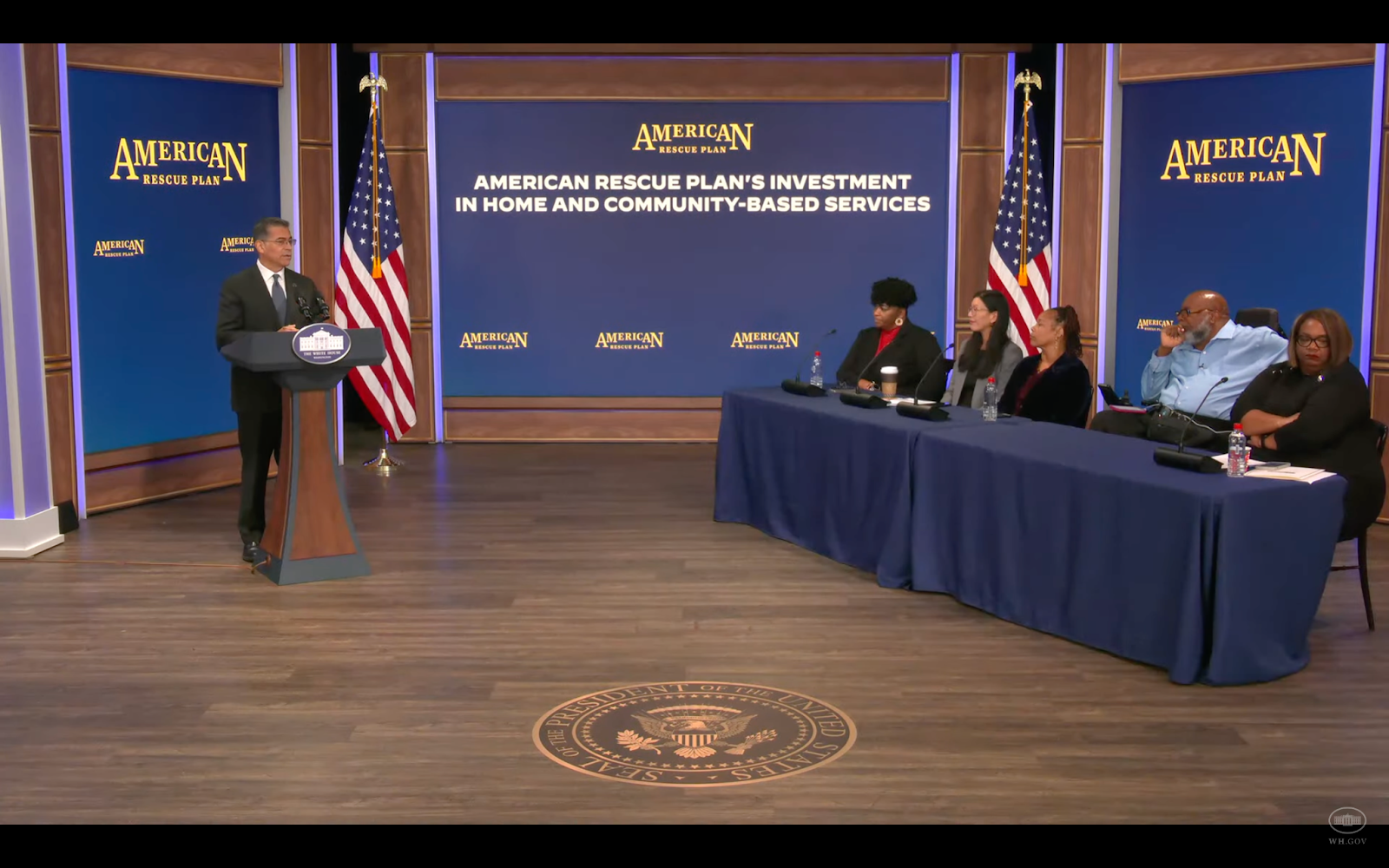FOR IMMEDIATE RELEASE: December 12, 2023
CONTACT: Daniela Perez, dperez@domesticworkers.org
ICYMI:
White House Convening on the American Rescue Plan’s Major Investment in Home & Community-Based Care
The National Domestic Workers Alliance, SEIU, and the National Council on Independent Living joined White House leaders on a panel discussion on the impact of federal investments on home- and community-based services.

Health and Human Services Secretary Xavier Becerra delivers opening remarks ahead of a panel discussion featuring NDWA President Ai-jen Poo, NDWA Member Diondre Clarke, SEIU Healthcare Pennsylvania Member Angela Engram, National Council on Independent Living Executive Director Theo Braddy, and SEIU Secretary-Treasurer April Verrett.
Complete Panel Discussion
White House Fact Sheet
WASHINGTON – On Tuesday, December 12, the White House convened an event highlighting the significant contributions of the American Rescue Plan (ARP) to the direct care workforce. The event featured engaging panel discussions with leaders from the National Domestic Workers Alliance, SEIU, National Council on Independent Living, and key policy leaders, highlighting the transformative effect of federal investments in home and community-based services.
Accompanying this event, the White House released a Fact Sheet revealing that ARP investments total approximately $37 billion across all states.
NDWA President Ai-jen Poo, SEIU Secretary-Treasurer April Verrett, National Council on Independent Living Executive Director Theo Braddy, and direct care workers joined key policy leaders and advocates in a panel discussion examining the ARP’s influence on the nation’s care infrastructure. Gene Sperling, Special Advisor to the President, moderated the discussion. Health and Human Services Secretary Xavier Becerra delivered opening remarks, while Domestic Policy Advisor Neera Tanden discussed the administration’s initiatives.
The ARP was instrumental during the pandemic, bolstering home and community-based services through significant federal funding. This included a 10% increase in the Federal Medical Assistance Percentage for one year. Guided by the Centers for Medicare & Medicaid Services, these funds led to enhanced compensation and benefits for direct care workers, with over $37 billion in additional federal funds generated. Nearly $25 billion was allocated for recruiting, training, and retaining direct care workers, significantly improving their compensation and support.
“Before the pandemic, the median annual income of a home-care worker was $21 thousand a year; we were in a deep crisis for the people we were counting on to care for us where they could not care for themselves or their own families on the income they earned. Then entered the pandemic, and this workforce became our lifeline for the people who were at the greatest risk as a result of COVID-19 – people with disabilities and older adults. It became a matter of life and death. This workforce showed up, and this American Rescue Plan was also the lifeline to our lifeline.” Ai-jen Poo, NDWA President, said. “Every single day, 10,000 people turn 65 in our country. By the year 2034, there will be more people over the age of 65 than under the age of 18. By the year 2050, there will be 27 million people who will need long-term care, and most of us are looking for it in the home and community. The American Rescue Plan is the down payment that helps us build the workforce and the infrastructure we need to make these jobs good jobs for the 21st century.”
April Verrett, SEIU Secretary-Treasurer, said, “The ARP investment in HCBS was a blueprint for the further transformation we need for the hundreds of thousands of workers in home care who keep this economy running and show up every day to provide care to families and their loved ones. Undeniably, care workers have benefited from ARP’s one-time investment in HCBS. And while it helped us build for the future, there’s still more work to do. A stronger infrastructure will build the workforce and create a brighter future in healthcare for workers, consumers, and their families.”
Home Care Worker and NDWA Organizer Diondre Clarke, who has been in home care since 2013, shared her experiences and the broader implications of the ARP. “I’ve been a care worker since 2013, starting at just $7.25 an hour. When the pandemic hit in 2020, I suddenly found myself labeled as an essential worker, a hero. It was a time filled with fear, not just for my own health but for my family’s, too. But I knew I had to be there for my clients, many of whom had families out of state and were struggling with loneliness and confusion about the ongoing crisis. Despite being essential, my pay didn’t reflect my vital role,” Clarke reflected. “As I continued to work through those scary times, I saw colleagues leave due to low wages. That’s when I discovered the National Domestic Workers Alliance (NDWA). It gave me the strength to fight for higher wages, better working conditions, and additional training. Participating in rallies and advocating for our rights was empowering. I’m thankful for the wage increases we’ve achieved, but there’s still more to do. We need continued investment in care workers – it’s not just deserved, it’s essential.”
Clarke’s advocacy journey began with her challenges in the profession, including low pay and increased risks during the pandemic. Her commitment led to her current role as a field organizer with NDWA.
Angela Engram, a care worker from Pittsburgh, Pennsylvania, and a member of the United Home Care Workers of Pennsylvania provided insights into the daily challenges and the importance of support for care workers. She emphasized the need for fair wages and benefits, sharing, “Home caregivers sustain lives. Our jobs, like hospital and nursing home workers, are needed to keep people alive. The pandemic made clear that something needs to be done to strengthen our care system. We have to be proactive. And the American Rescue Plan was a necessary first step.” Engram’s dedication to caring for her family and community members and her advocacy for better conditions and compensation highlight care workers’ critical role.
Katrina Mouzon, an NDWA North Carolina Chapter member who entered the home healthcare field after her parents died in 2008, was also present. Despite facing wage disparities and tough working conditions, Mouzon has steadfastly advocated for improved wages and conditions for home care workers. Although Mouzon did not participate in the panel, she was in the audience; before the panel discussion, she shared, “We need continued investment in the home care system to improve wages and working conditions for care workers. It’s not just about pay; it’s about respect and providing adequate resources to care for our patients properly.”
NDWA and SEIU continue to tirelessly advocate for the rights and protections of all care workers like Diondre, Katrina, and Angela. The commitment to collaboration and investment in our home and community-based services remains crucial.
###
National Domestic Workers Alliance (NDWA) is the leading voice for dignity and fairness for millions of domestic workers in the United States. Founded in 2007, NDWA works for respect, recognition and inclusion in labor protections for domestic workers, the majority of whom are immigrants and women of color. NDWA is powered by over 70 affiliate organizations and local chapters and by a growing membership base of nannies, house cleaners and care workers in over 20 states. Learn more at
www.domesticworkers.org. NDWA is a non-partisan non-profit organization that does not endorse, support, or oppose any candidates for public office.
![ICYMI: White House Convening on the American Rescue Plan's Major Investment in Home & Community-Based Care]()
![ICYMI: White House Convening on the American Rescue Plan's Major Investment in Home & Community-Based Care]()
